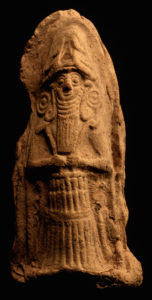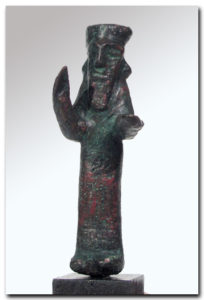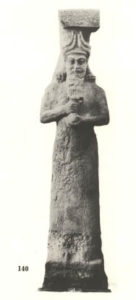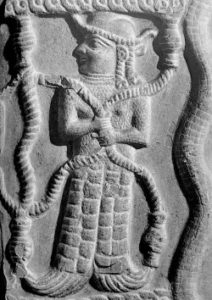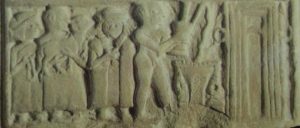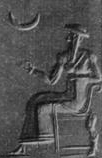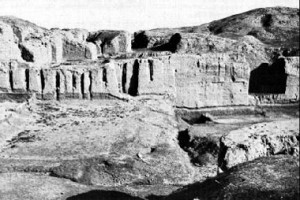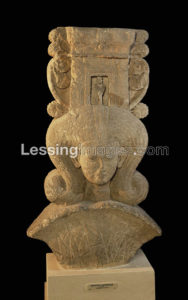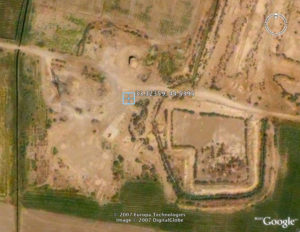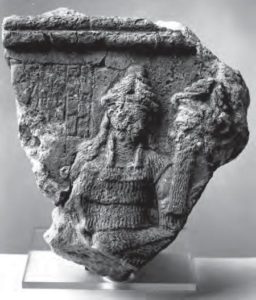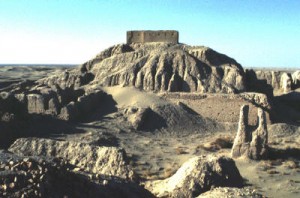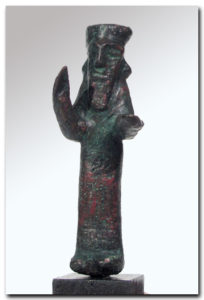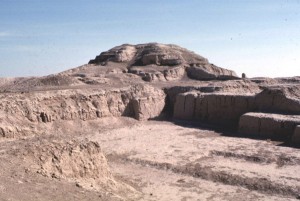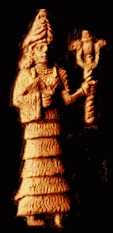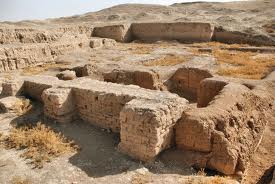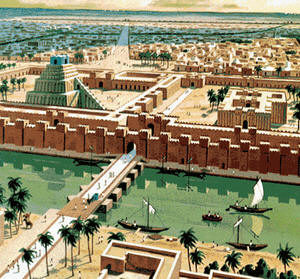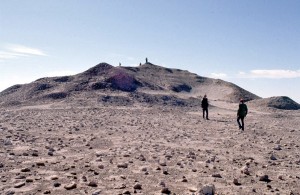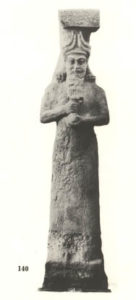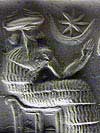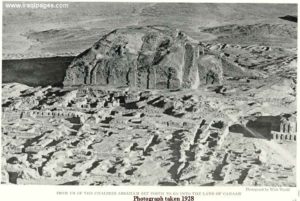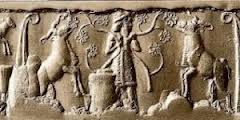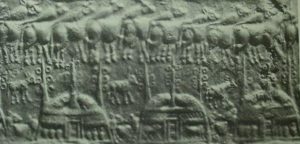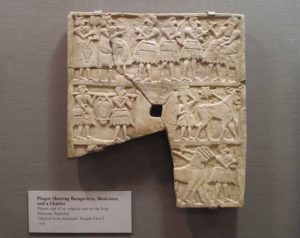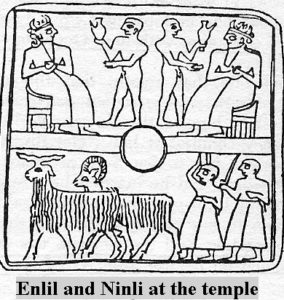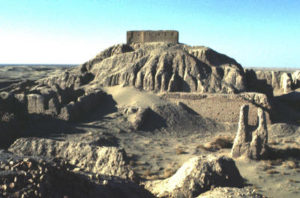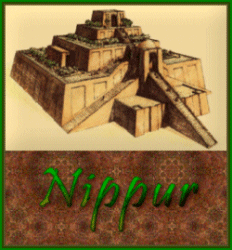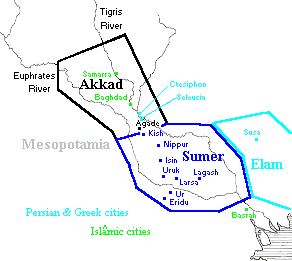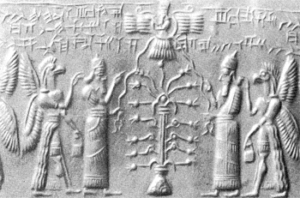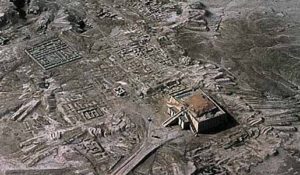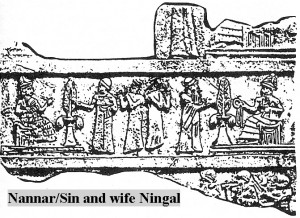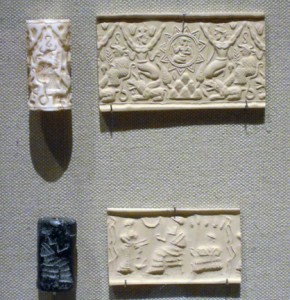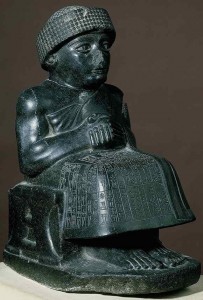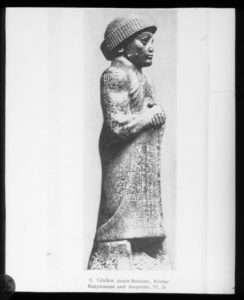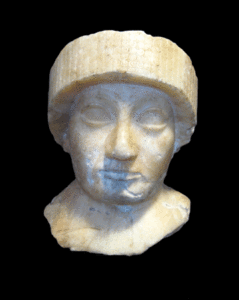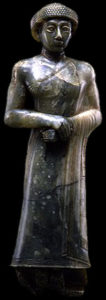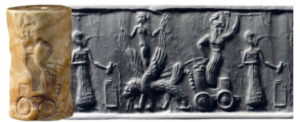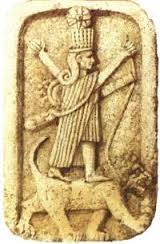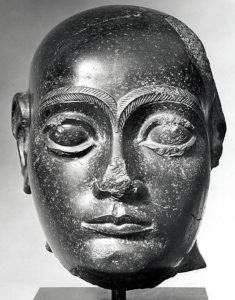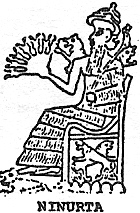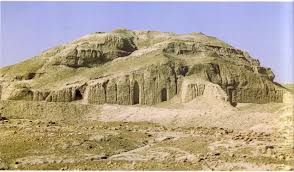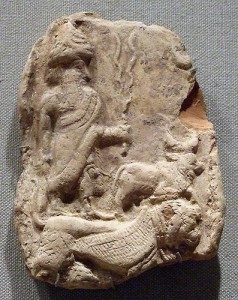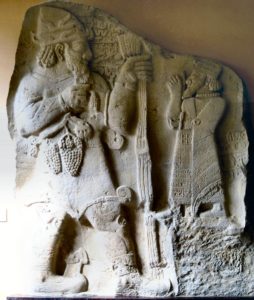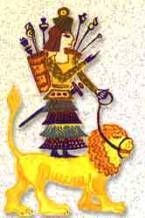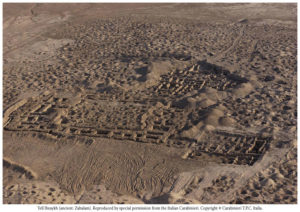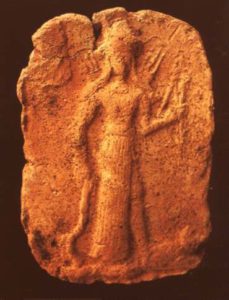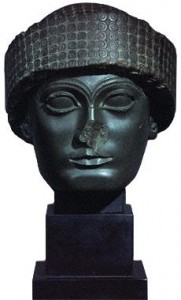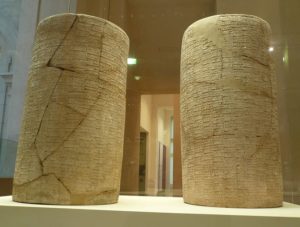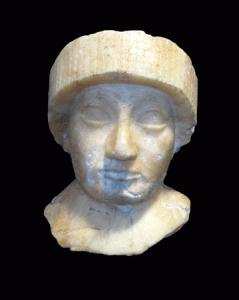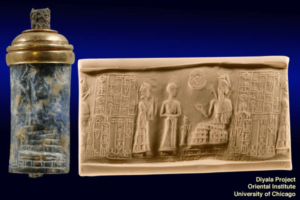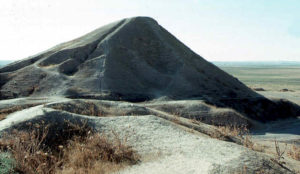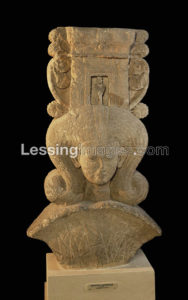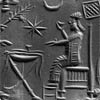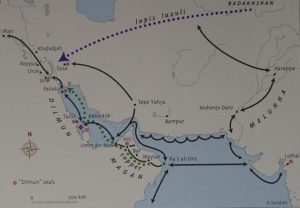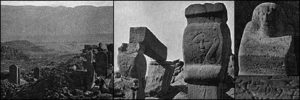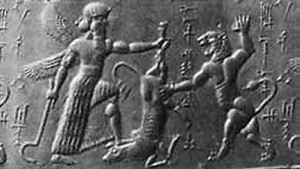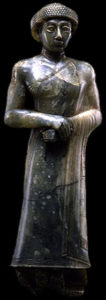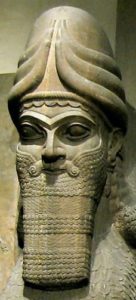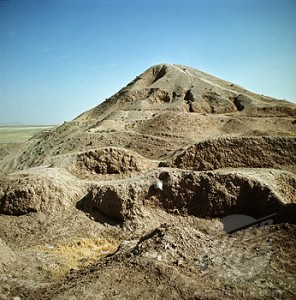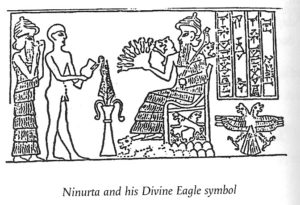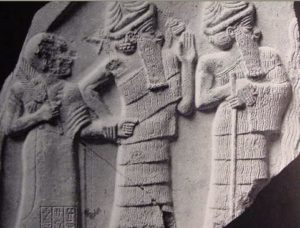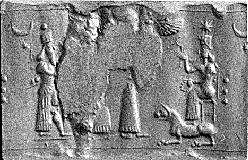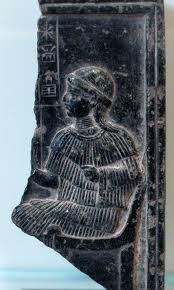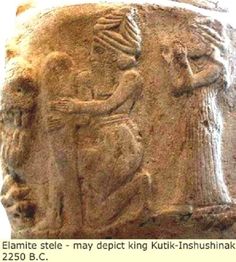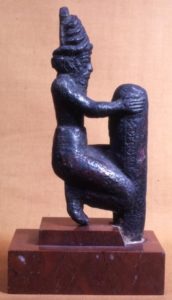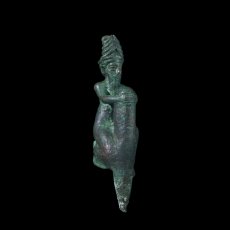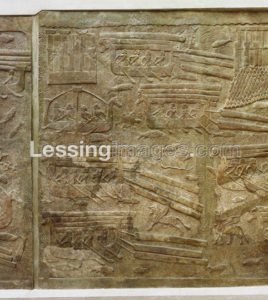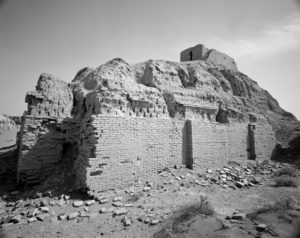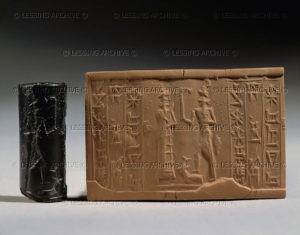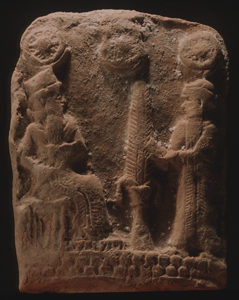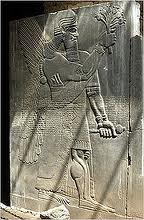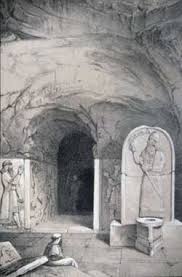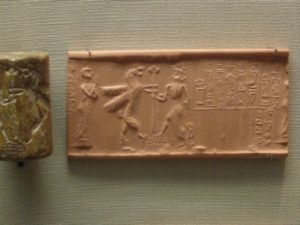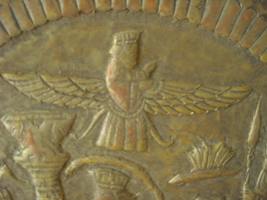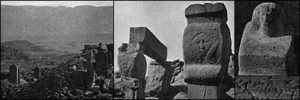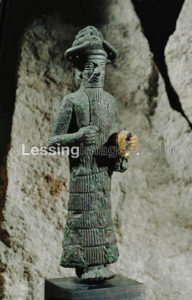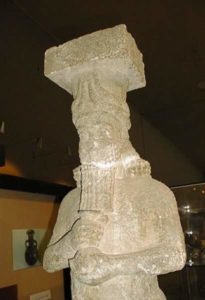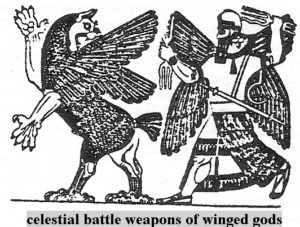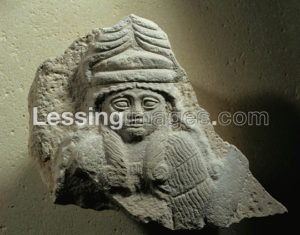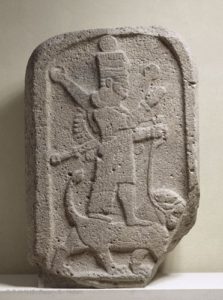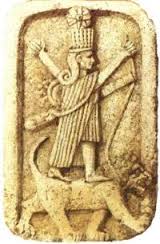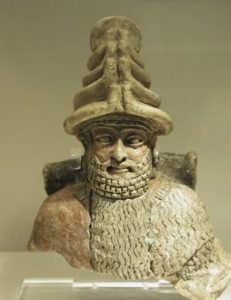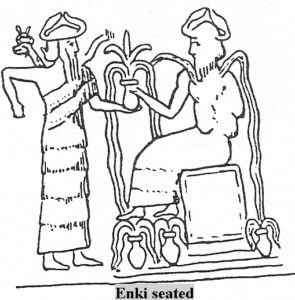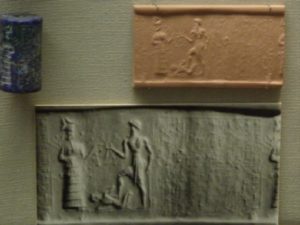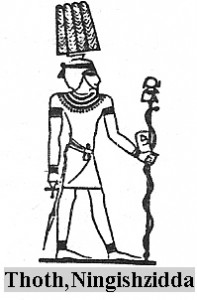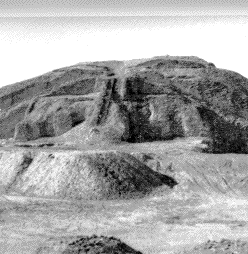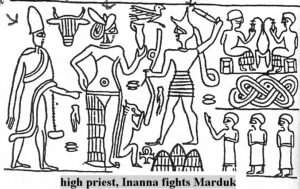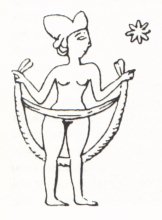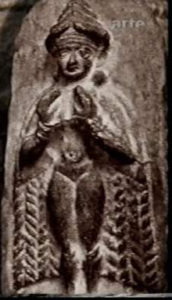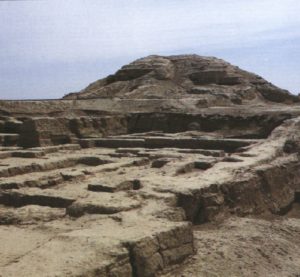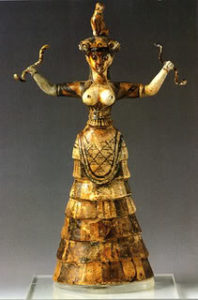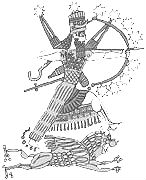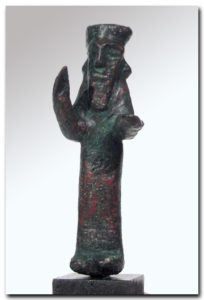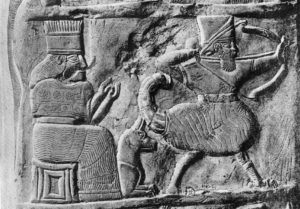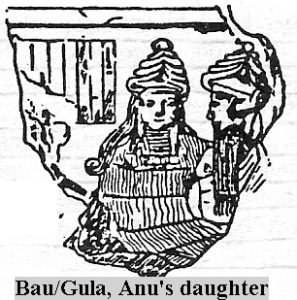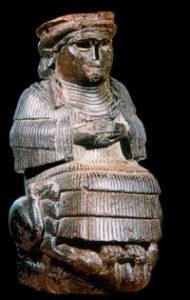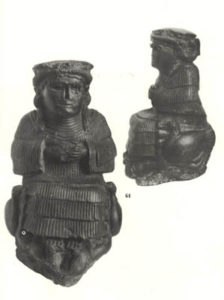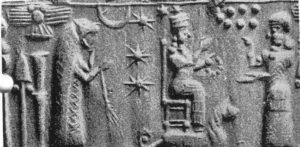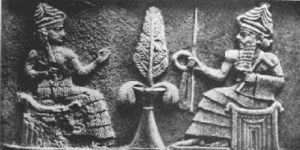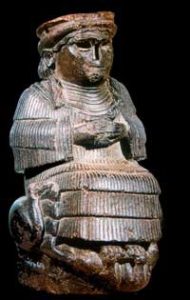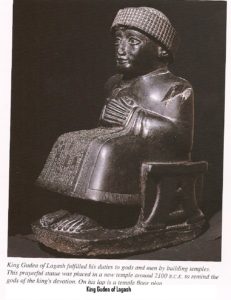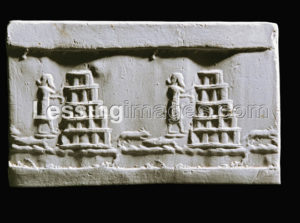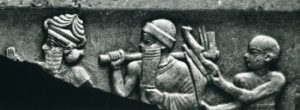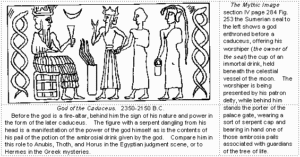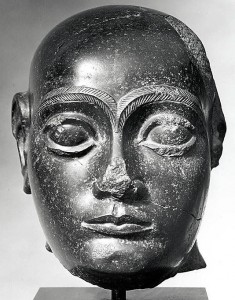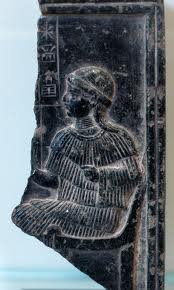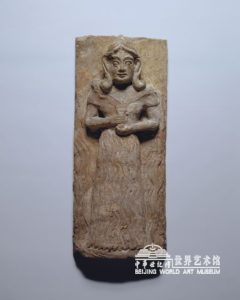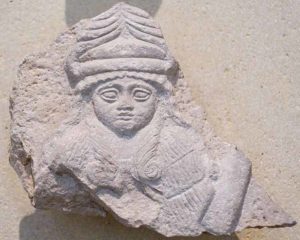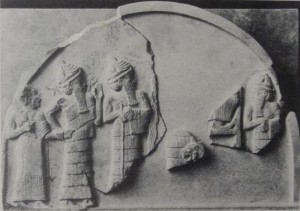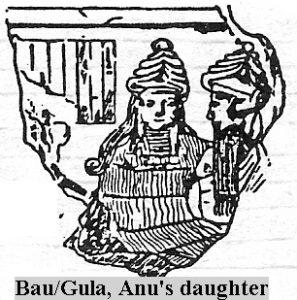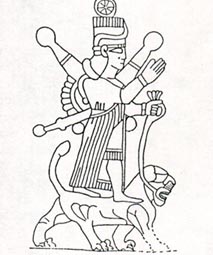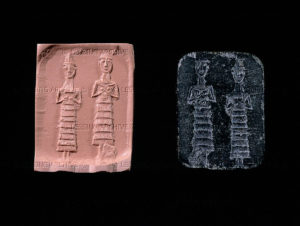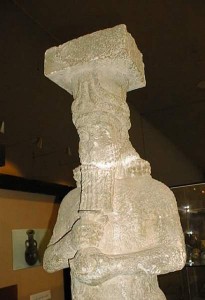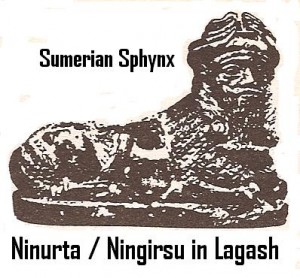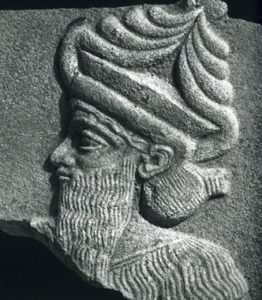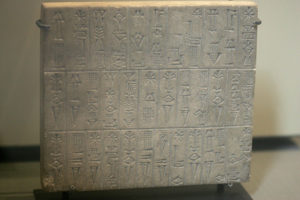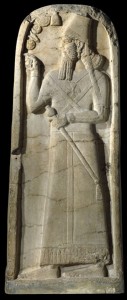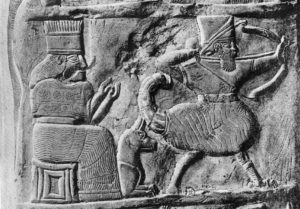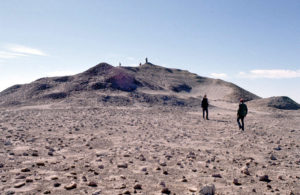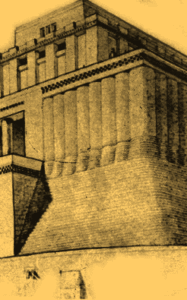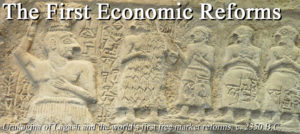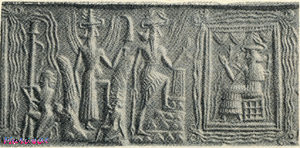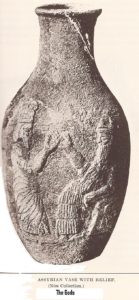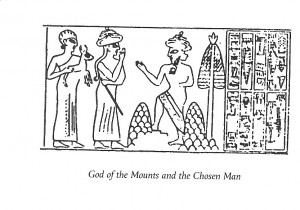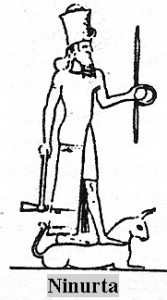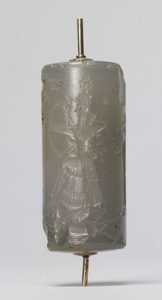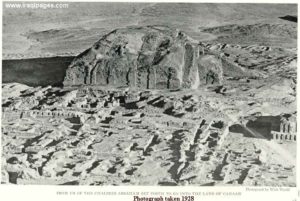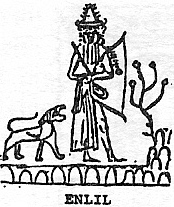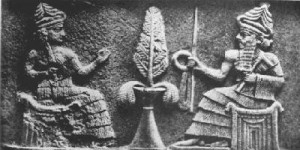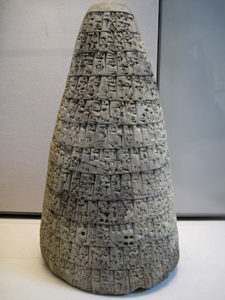Source: Black, J. A., Cunningham, G., Robson, E. and Zólyomu, G. The Electronic Text Corpus of Sumerian Literature, Oxford University, 1998 – © All rights reserved to authors. Text reproduced here for aid in research and study purposes
(Texts: All Artifacts, Color Coding, & Writings in Bold Type With Italics Inside Parenthesis, are Added by Editor R. Brown, not the Authors, Translators, or Publishers!)
(gods in blue …mixed-breed demigods in teal…)
1-2 To overturn the appointed times, to obliterate the divine plans,
the storms gather to strike like a flood.
(Anu, King of the Anunnaki, son & heir Enlil, Earth Colony Commander, Enki, eldest & wisest son to Anu, Ninhursag, Anu‘s eldest daughter)
3-11 An, Enlil, Enki and Ninhursaja (Ninhursag) (2 mss. have instead: Ninmah (Ninhursag) have decided its fate —
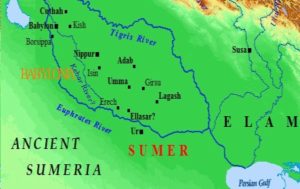 (Sumer, land of the gods “between the rivers” Euphrates & Tigris)
(Sumer, land of the gods “between the rivers” Euphrates & Tigris)
to overturn the divine powers of Sumer, to lock up the favorable reign in its home,
to destroy the city, to destroy the house, to destroy the cattle-pen, to level the sheepfold;
that the cattle should not stand in the pen, that the sheep should not multiply in the fold,
that watercourses should carry brackish water, that weeds should grow in the fertile fields,
that mourning plants should grow in the open country,
12-21 that the mother should not seek out her child, that the father should not say “O my dear wife!”,
that the junior wife should take no joy in his embrace, that the young child should not grow vigorous on his knee,
that the wet-nurse should not sing lullabies; to change the location of kingship, to defile the seeking of oracles,
to take kingship away from the Land, to cast the eye of the storm on all the land,
to obliterate the divine plans by the order of An (Anu) and Enlil;
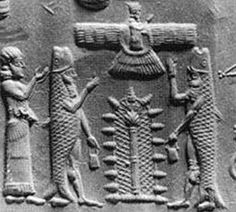 (Anu, King of the Anunnaki giants, in his winged sky-disc)
(Anu, King of the Anunnaki giants, in his winged sky-disc)
22-26 after An (Anu) had frowned upon all the lands, after Enlil had looked favorably on an enemy land,
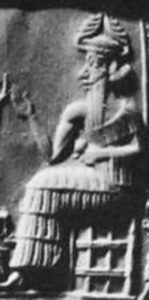 (Enlil, King Anu‘s son & heir, born of the Anunnaki “double seed” law of succession)
(Enlil, King Anu‘s son & heir, born of the Anunnaki “double seed” law of succession)
after Nintud (Ninhursag) had scattered the creatures that she had created,
after Enki had altered the course of the Tigris and Euphrates, after Utu had cast his curse on the roads and highways;
27-37 so as to obliterate the divine powers of Sumer, to change its preordained plans,
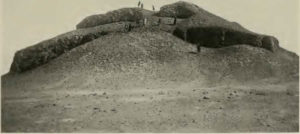 (early photo of Ur ruins prior excavation)
(early photo of Ur ruins prior excavation)
to alienate the divine powers of the reign of kingship of Urim (Ur),
to humiliate the princely son in his house E-kic-nu-jal (holy of holies within Ur ziggurat),
to break up the unity of the people of Nanna (Nannar), numerous as ewes;
to change the food offerings of Urim, the shrine of magnificent food offerings;
that its people should no longer dwell in their quarters, that they should be given over to live in an inimical place;
that Cimacki and Elam, the enemy, should dwell in their place;
that its shepherd, in his own palace, should be captured by the enemy,
that (King) Ibbi-Suen should be taken to the land Elam in fetters,
that from Mount Zabu on the edge of the sea to the borders of Ancan,
like a swallow that has flown from its house, he should never return to his city;
38-46 that on the two banks of the Tigris and of the Euphrates bad weeds should grow,
that no one should set out on the road, that no one should seek out the highway,
that the city and its settled surroundings should be razed to ruin-mounds;
that its numerous black-headed people should be slaughtered;
that the hoe should not attack the fertile fields, that seed should not be planted in the ground,
that the melody of the cowherds’ songs should not resound in the open country,
that butter and cheese should not be made in the cattle-pen, that dung should not be stacked on the ground,
that the shepherd should not enclose the sacred sheepfold with a fence,
that the song of the churning should not resound in the sheepfold;
47-55 to decimate the animals of the open country, to finish off all living things,
that the four-legged creatures of Cakkan should lay no more dung on the ground,
that the marshes should be so dry as to be full of cracks and have no new seed,
that sickly-headed reeds should grow in the reed-beds, that they should be covered by a stinking morass,
that there should be no new growth in the orchards, that it should all collapse by itself —
so as quickly to subdue Urim (Ur) like a roped ox, to bow its neck to the ground:
the great charging wild bull, confident in its own strength,
the primeval city of lordship and kingship, built on sacred ground.
56-57 Its fate cannot be changed. Who can overturn it?
It is the command of An and Enlil. Who can oppose it?
58-68 An frightened the very dwellings of Sumer, the people were afraid.
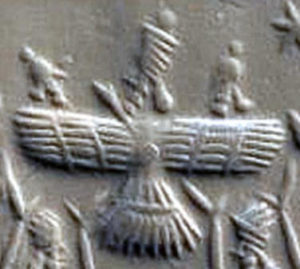 (Enlil, Anu, & Enki traverses the skies in his sky-disc)
(Enlil, Anu, & Enki traverses the skies in his sky-disc)
Enlil blew an evil storm, silence lay upon the city.
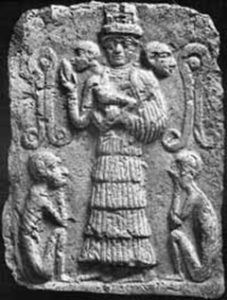 (Ninhursag, Cheif DNA Medical Scientist, with early attempts to create human workers)
(Ninhursag, Cheif DNA Medical Scientist, with early attempts to create human workers)
Nintud (Ninhursag) bolted the door of the storehouses of the Land.
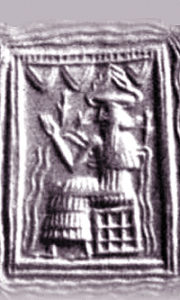 (Enki, King Anu‘s eldest & wisest son, 1st to arrive on Earth with a group of 50)
(Enki, King Anu‘s eldest & wisest son, 1st to arrive on Earth with a group of 50)
Enki blocked the water in the Tigris and the Euphrates.
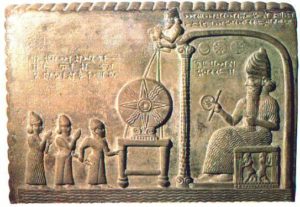 (giant alien god Utu & the Wheel of Justice)
(giant alien god Utu & the Wheel of Justice)
Utu took away the pronouncement of equity and justice.
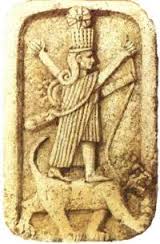 (Inanna, Goddess of War, atop her zodiac symbol Leo, her 8-Pointed Star symbol above her head)
(Inanna, Goddess of War, atop her zodiac symbol Leo, her 8-Pointed Star symbol above her head)
Inanna handed over victory in strife and battle to a rebellious land.
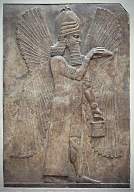 (Ninurta relief discovered in ancient Sumer ruins, artifacts of the giant gods & their giant mixed-breed offspring appointed to kingships, are shamefully being destroyed by Radical Islam, attempting to hide the truth of our forgotten past)
(Ninurta relief discovered in ancient Sumer ruins, artifacts of the giant gods & their giant mixed-breed offspring appointed to kingships, are shamefully being destroyed by Radical Islam, attempting to hide the truth of our forgotten past)
Ninjirsu (Ninurta) poured Sumer away like milk to the dogs.
Turmoil descended upon the Land, something that no one had ever known,
something unseen, which had no name, something that could not be fathomed.
The lands were confused in their fear.
The god of the city turned away, its shepherd vanished.
69-78 The people, in their fear, breathed only with difficulty.
The storm immobilized them, the storm did not let them return.
There was no return for them, the time of captivity did not pass.
What did Enlil, the shepherd (Commander) of the black-headed people, do?
Enlil, to destroy the loyal households, to decimate the loyal men,
to put the evil eye on the sons of the loyal men, on the first-born,
Enlil then (after nuclear missile attacks) sent down Gutium (ape-like primitives, barbarians) from the mountains.
Their advance was as the flood of Enlil that cannot be withstood.
The great wind of the countryside filled the countryside, it advanced before them.
The extensive countryside was destroyed, no one moved about there.
79-92 The dark time was roasted by hailstones and flames.
The bright time was wiped out by a shadow.
(2 mss. add 2 lines: On that bloody day, mouths were crushed, heads were crashed.
The storm was a harrow coming from above, the city was struck by a hoe.)
On that day, heaven rumbled, the earth trembled, the storm worked without respite.
Heaven was darkened, it was covered by a shadow; the mountains roared.
Utu (the Sun God) lay down at the horizon, dust passed over the mountains.
Nanna (the Moon Crescent God) lay at the zenith, the people were afraid.
The city …… stepped outside.
The foreigners in the city even chased away its dead.
Large trees were uprooted, the forest growth was ripped out.
The orchards were stripped of their fruit, they were cleaned of their offshoots.
The crop drowned while it was still on the stalk, the yield of the grain diminished.
3 lines fragmentary
93-103 They piled …… up in heaps, they spread …… out like sheaves.
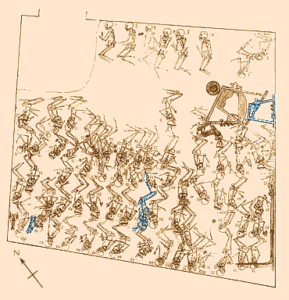 (death pits in Ur)
(death pits in Ur)
There were corpses floating in the Euphrates, brigands roamed the roads.
The father turned away from his wife without saying “O my wife!”
The mother turned away from her child without saying “O my child!”
He who had a productive estate neglected his estate without saying “O my estate!”
The rich man took an unfamiliar path away from his possessions.
In those days the kingship of the Land was defiled.
The tiara and crown that had been on the king’s head were both spoiled.
The lands that had followed the same path were split into disunity.
The food offerings of Urim, the shrine of magnificent food offerings, were changed for the worse.
Nanna (Nannar) traded away his people, numerous as ewes.
104-111 Its king sat immobilized in the palace, all alone.
Ibbi-Suen was sitting in anguish in the palace, all alone (last king of Ur).
In E-namtila, his place of delight, he wept bitterly.
The devastating flood was leveling everything (blasts, then nuclear fall-out).
Like a great storm it roared over the earth — who could escape it? — to destroy the city, to destroy the house,
so that traitors would lie on top of loyal men and the blood of traitors flow upon loyal men.
112 1st kirugu.
113 The storms gather to strike like a flood.
114 Jicgijal to the kirugu.
(wall ruins of Ninhursag‘s patron city Kish, where kingship began; Ninhursag, sister-lover to Enki)
115-122 The house of Kic (Kish), Hursaj-kalama (residence of Ninhursag), was destroyed.
Zababa (son to Enlil) took an unfamiliar path away from his beloved dwelling (in Kish).
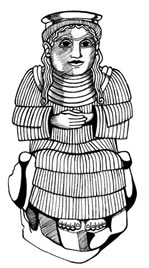 (Bau, Anu‘s daughter, Ninurta‘s spouse & aunt, patron goddess of Isin)
(Bau, Anu‘s daughter, Ninurta‘s spouse & aunt, patron goddess of Isin)
Mother Bau (Ninurta‘s spouse) was lamenting bitterly in her E-Iri-kug (residence).
“Alas, the destroyed city, my destroyed house,” she cried bitterly.
1 line fragmentary
2 lines missing
“Alas, the destroyed city, my destroyed house,” she cried bitterly.
123-132 Kazallu, the city of teeming multitudes, was cast into confusion.
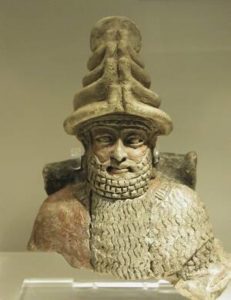 (Utu, son to Nannar & Ningal, Inanna‘s twin brother)
(Utu, son to Nannar & Ningal, Inanna‘s twin brother)
Numucda (Utu) took an unfamiliar path away from the city, his beloved dwelling.
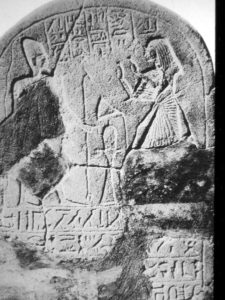 (Utu & his lovely spouse Aya / Aia / Namrat)
(Utu & his lovely spouse Aya / Aia / Namrat)
His wife Namrat (Aya), the beautiful lady, was lamenting bitterly.
“Alas, the destroyed city, my destroyed house,” she cried bitterly.
Its river bed was empty, no water flowed.
Like a river cursed by Enki its opening channel was dammed up.
On the fields fine grains grew no more, people had nothing to eat.
The orchards were scorched like an oven, its open country was scattered.
The four-legged wild animals did not run about.
The four-legged creatures of Cakkan could find no rest.
133-142 Lugal-Marda (son of Ninurta) stepped outside his city.
Ninzuana (unidentified, spouse to Lugal-Marda?) took an unfamiliar path away from her beloved dwelling.
“Alas, the destroyed city, my destroyed house,” she cried bitterly.
Isin, the shrine that was not a quay, was split by onrushing waters.
(Isin heavily looted ruins; Bau, patron goddess of Isin, & Ninurta, her nephew-spouse)
Nininsina (Bau), the mother of the Land, wept bitter tears.
“Alas, the destroyed city, my destroyed house,” she cried bitterly.
Enlil smote Dur-an-ki (communication center in Nippur) with a mace.
(Enlil‘s ziggurat residence in Nippur, alien Command Central, the Duranki / “Bond Heaven Earth”; Enlil)
Enlil made lamentation in his city, the shrine Nibru (Nippur).
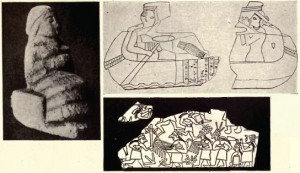 (Ninlil, spouse & equal partner to Enlil)
(Ninlil, spouse & equal partner to Enlil)
Mother Ninlil, the lady of the Ki-ur (inner residence in Nippur ziggurat) shrine, wept bitter tears.
“Alas, the destroyed city, my destroyed house,” she cried bitterly.
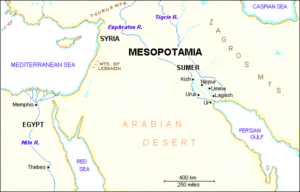 (earthlings 1st cities, established by giant alien gods)
(earthlings 1st cities, established by giant alien gods)
143-154 Kec (Kish), built all alone on the high open country, was haunted.
Adab, the settlement which stretches out along the river,
was treated as a rebellious land. (1 ms. has instead: was deprived of water.)
The snake of the mountains made his lair there, it became a rebellious land.
The Gutians (primitives) bred there, issued their seed.
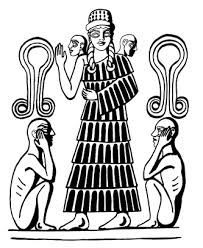 (Ninhursag, Chief DNA Medical Scientist, mother to Ninurta)
(Ninhursag, Chief DNA Medical Scientist, mother to Ninurta)
Nintud (Ninhursag) wept bitter tears over her creatures (new breed fashioned as their workers).
“Alas, the destroyed city, my destroyed house,” she cried bitterly.
In Zabalam the sacred Giguna was haunted.
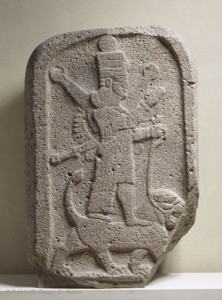 (Inanna, Goddess of War in her battle dress, atop zodiac Leo the lion symbol)
(Inanna, Goddess of War in her battle dress, atop zodiac Leo the lion symbol)
Inanna abandoned Unug (Uruk) and went off to enemy territory.
(Uruk‘s ziggurat residence of many alien Anunnaki from planet Nibiru; Inanna ruling over Uruk)
In the E-ana (Uruk’s ziggurat above) the enemy set eyes upon the sacred Jipar shrine.
The sacred Jipar of en-ship was defiled.
Its en priest was snatched from the Jipar and carried off to enemy territory.
“Alas, the destroyed city, my destroyed house,” she cried bitterly.
155-162 A violent storm blew over Umma, brickwork in the midst of the highlands.
Cara (Shara, Inanna‘s son) took an unfamiliar path away from the E-mah, his beloved dwelling.
Ninmul (unidentified, Shara’s spouse?) cried bitter tears over her destroyed city.
“Oh my city, whose charms can no longer satisfy me,” she cried bitterly.
Jirsu, the city of heroes, was afflicted with a lightning storm (alien technologies).
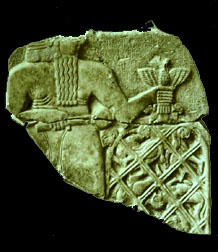 (Ninurta holds earthlings captive in his alien high-tech battle net)
(Ninurta holds earthlings captive in his alien high-tech battle net)
Ninjirsu (Ninurta, spouse to Bau) took an unfamiliar path away from the E-ninnu (Ninurta’s ziggurat residence).
Mother Bau wept bitter tears in her E-Iri-kug.
“Alas, the destroyed city, my destroyed house,” she cried bitterly.
163-173 On that day the word of Enlil was an attacking storm.
Who could fathom it?
The word of Enlil was destruction on the right, was …… on the left.
What did Enlil do in order to decide the fate of mankind?
Enlil brought down the Elamites, the enemy, from the highlands.
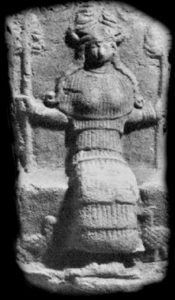 (Nanshe / Nance, Enki‘s daughter, Goddess of Birds & Fish of the Persian Gulf)
(Nanshe / Nance, Enki‘s daughter, Goddess of Birds & Fish of the Persian Gulf)
Nance, the noble daughter (to senior Prince Enki), was settled outside the city.
Fire approached Ninmarki in the shrine Gu-aba.
Large boats were carrying off its silver and lapis lazuli.
The lady, sacred Ninmarki (Enki’s & Nina‘s daughter), was despondent because of her perished goods.
Then the day ……, burning like …….
(Lagash ruins; re-creation of Ninurta‘s city of Lagash, place of great “mighty men” kings under Ninurta)
The province of Lagac (Lagash) was handed over to Elam.
And then the queen also reached the end of her time.
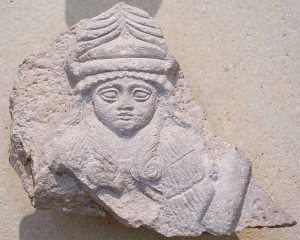 (Enlil‘s 1/2 sister Bau, also his daughter-in-law)
(Enlil‘s 1/2 sister Bau, also his daughter-in-law)
174-184 Bau, as if she were human, also reached the end of her time:
“Woe is me! Enlil has handed over the city to the storm.
He has handed it over to the storm (weapon) that destroys cities.
He has handed it over to the storm that destroys houses.”
Dumuzid-abzu (Geshtinanna) was full of fear in the house of Kinirca.
Kinirca, the city of her noble youth, was ordered to be plundered.
The city of Nance, Nijin, was delivered to the foreigners.
Sirara, her beloved dwelling, was handed over to the evil ones.
“Alas, the destroyed city, my destroyed house,” she cried bitterly.
Its sacred Jipar of en-ship was defiled.
Its en priest was snatched from the Jipar and carried off to enemy territory.
185-192 Mighty strength was set against the banks of the Id-nuna-Nanna canal.
The settlements of the E-danna of Nanna, like substantial cattle-pens, were destroyed.
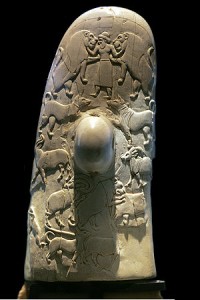
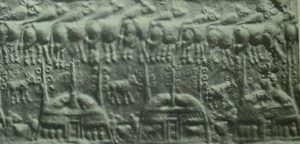 (Nannar with his cattle pens in Ur)
(Nannar with his cattle pens in Ur)
Their refugees, like stampeding goats, were chased (?) by dogs.
They destroyed Gaec like milk poured out to dogs, and shattered its finely fashioned statues.
“Alas, the destroyed city, my destroyed house,” she cried bitterly.
Its sacred Jipar of en-ship was defiled.
Its en priest was snatched from the Jipar and carried off to enemy territory.
193-205A lament was raised at the dais that stretches out toward heaven.
Its heavenly throne was not set up, was not fit to be crowned (?).
It was cut down as if it were a date palm and tied together.
Accu, the settlement that stretches out along the river, was deprived of water.
At the place of Nanna where evil had never walked, the enemy walked.
How was the house treated thus?
The E-puhruma was emptied.
Ki-abrig, which used to be filled with numerous cows and numerous calves, was destroyed like a mighty cattle-pen.
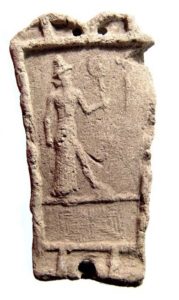 (Utu / Ningubalag, patron god of Sippar, Nanshe‘s father-in-law)
(Utu / Ningubalag, patron god of Sippar, Nanshe‘s father-in-law)
Ningubalag (Utu) took an unfamiliar path away from the Ja-bur.
Niniagar (Utu‘s daughter) wept bitter tears all alone.
“Alas, the destroyed city, my destroyed house,” she cried bitterly.
Its sacred Jipar (Sippar, Utu‘s patron city) of en-ship was defiled.
Its en priest was snatched from the Jipar and carried off to enemy territory.
206-213 Ninazu (Ereshkigal‘s son) deposited his weapon in a corner in the E-gida.
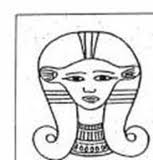
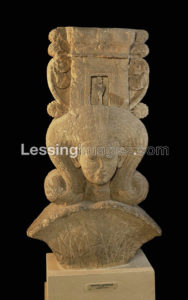 (Ninhursag, patron goddess of Kish)
(Ninhursag, patron goddess of Kish)
An evil storm swept over Ninhursaja (Ninhursag) at the E-nutura.
Like a pigeon she flew from the window, she stood apart in the open country.
“Alas, the destroyed city, my destroyed house,” she cried bitterly.
In Jicbanda, the house that was filled with lamentation, lamentation reeds grew.
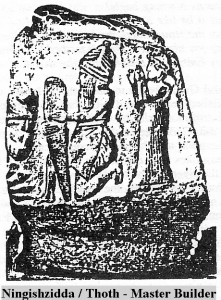 (Ningishzidda set the foundation pegs to construct many ziggurats everywhere)
(Ningishzidda set the foundation pegs to construct many ziggurats everywhere)
Ninjiczida (Ningishzidda) took an unfamiliar path away from Jicbanda.
Azimua (Ningishzidda‘s spouse, Enki‘s daughter), the queen of the city, wept bitter tears.
“Alas, the destroyed city, my destroyed house,” she cried bitterly.
214-220 On that day, the storm forced people to live in darkness.
In order to destroy Kuara, it forced people to live in darkness.
Ninehama (unidentified) in her fear wept bitter tears.
“Alas the destroyed city, my destroyed house,” she cried bitterly.
 (Marduk, Enki‘s eldest son, patron god of Babylon, & also Egypt)
(Marduk, Enki‘s eldest son, patron god of Babylon, & also Egypt)
Asarluhi (Marduk) put his robes on with haste and …….
Lugalbanda (Ninsun‘s giant semi-divine spouse) took an unfamiliar path away from his beloved dwelling.
(1 ms. adds: Ninsun …….) “Alas the destroyed city, my destroyed house,” she cried bitterly.
(Enki‘s Eridu ruins well buried by time; Enki, wisest of the gods)
221-224 Eridug (Eridu, Enki‘s patron city), floating on great waters, was deprived (?) of drinking water.
In its outer environs, which had turned into haunted plains, …….
The loyal man in a place of treachery ……. Ka-hejala and Igi-hejala (unidentified minor alien gods) …….
225-233 “I, a young man whom the storm has not destroyed, …….
I, not destroyed by the storm, my attractiveness not brought to an end, …….
We have been struck down like beautiful boxwood trees.
We have been struck down like …… with colored eyes.
We have been struck down like statues being cast in molds.
The Gutians, the vandals, are wiping us out.
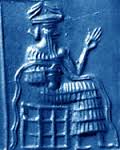
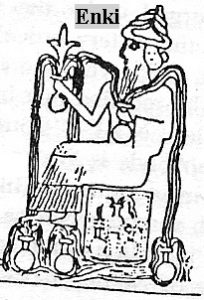 (Enki, King Anu‘s eldest & wisest son, patron god of Eridu, God of Waters)
(Enki, King Anu‘s eldest & wisest son, patron god of Eridu, God of Waters)
We turned to father Enki in the abzu (marshlands) of Eridug.
…… what can we say, what more can we add?
…… what can we say, what more can we add?
234-242 “…… we have been driven out of Eridug.
We who were in charge of …… during the day are eclipsed (?) by shadows.
We who were in charge of …… during the night are …… by the storm.
How shall we receive among our weary ones him who was in charge during the day?
How shall we let him who was in charge by night go astray among our sleepless ones?
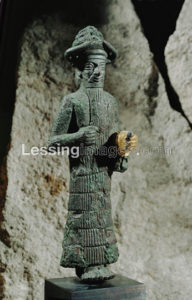 (Enki, King Anu‘s son, 1st to arrive on Earth with group of 50)
(Enki, King Anu‘s son, 1st to arrive on Earth with group of 50)
Enki, your city has been cursed, it has been given to an enemy land.
Why do they reckon us among those who have been displaced from Eridug?
Why do they destroy us like palm trees, us who were not violent?
Why do they break us up, like a new boat that has not ……?”
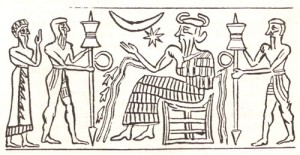 (Enki with his son & earthling workers in the abzu)
(Enki with his son & earthling workers in the abzu)
243-250 After Enki had cast his eyes on a foreign land,
1 line unclear
…… have risen up, have called on their cohorts.
Enki took an unfamiliar path away from Eridug.
Damgalnuna (Enki‘s spouse Damkina, sometimes Enki‘s spouse Ninhursag), the mother of the E-mah, wept bitter tears.
“Alas the destroyed city, my destroyed house,” she cried bitterly.
Its sacred Jipar of en-ship was defiled.
Its en priest was snatched from the Jipar and carried off to enemy territory.
(Nannar, Moon Crescent God of Ur; Nannar‘s temple residence way above his patron city Ur)
251-259 In Urim (home of Biblical Abraham) no one went to fetch food, no one went to fetch water.
Those who went to fetch food, went away from the food and will not return.
Those who went to fetch water, went away from the water and will not return.
To the south, the Elamites stepped in, slaughtering …….
In the uplands, the vandals, the enemy, …….
The Tidnum daily strapped the mace to their loins.
To the south, the Elamites, like an onrushing wave, were …….
In the uplands, like chaff blowing in the wind, they …… over the open country.
Urim, like a great charging wild bull, bowed its neck to the ground.
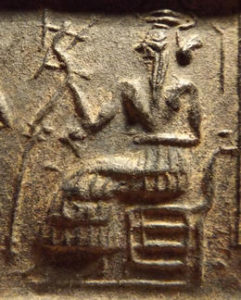 (Enlil, King Anu‘s son & heir, stationed on Earth as the Anunnaki Commander in Chief)
(Enlil, King Anu‘s son & heir, stationed on Earth as the Anunnaki Commander in Chief)
260-271 What did Enlil, who decides the fates, then do?
Again he sent down the Elamites, the enemy, from the mountains.
The foremost house, firmly founded, …….
In order to destroy Kisiga, ten men, even five men …….
Three days and three nights did not pass, …… the city was raked by a hoe.
(Dumuzi “The Shepherd”, Inanna‘s spouse, Enki‘s & Ninsun‘s son; Dumuzi‘s hands & feet in cuffs)
Dumuzid left Kisiga like a prisoner of war, his hands were fettered.
5 lines fragmentary
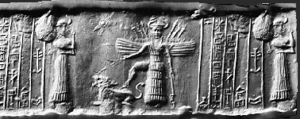 (Ninshubur & Inanna, Goddess of War)
(Ninshubur & Inanna, Goddess of War)
271-280 She (Inanna?) rode away from her possessions, she went to the mountains.
She loudly sang out a lament over those brightly lit mountains:
“I am queen, but I shall have to ride away from my possessions, and now I shall be a slave in those parts.
I shall have to ride away from my silver and lapis lazuli, and now I shall be a slave in those parts.
There, slavery, …… people, who can …… it?
There, slavery, Elam ……, who can …… it?
Alas, the destroyed city, my destroyed house,” she cried bitterly.
My queen, though not the enemy, went to enemy land.
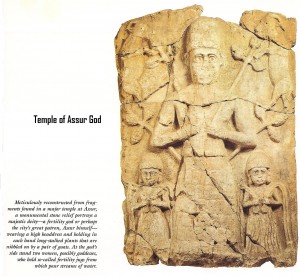 (Dumuzi “The Shepherd”, son to Enki & Ninsun)
(Dumuzi “The Shepherd”, son to Enki & Ninsun)
Ama-ucumgal-ana (Dumuzi, Inanna‘s spouse) …… Kisiga.
Like a city …….
281 2nd kirugu.
1 line fragmentary
1 line missing
284 Jicgijal to the kirugu.
7 lines missing or fragmentary
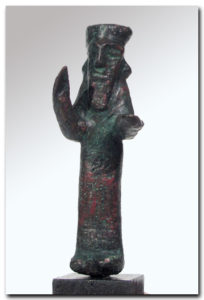 (Enlil)
(Enlil)
(Enlil, alien god who caused the Great Flood, Biblical Noah, & then later approved a nuclear attack on Marduk,- Sodom & Gomorrah)
292-302 Enlil threw open the door of the grand gate to the wind.
In Urim no one went to fetch food, no one went to fetch water.
Its people rushed around like water being poured from a well.
Their strength ebbed away, they could not even go on their way.
Enlil afflicted the city with an evil famine.
He afflicted the city with that which destroys cities, that which destroys houses.
He afflicted the city with that which cannot be withstood with weapons.
He afflicted the city with dissatisfaction and treachery.
In Urim, which was like a solitary reed, there was not even fear.
Its people, like fish being grabbed in a pond, sought to escape.
Its young and old lay spread about, no one could rise.
303-317 At the royal station (?) there was no food on top of the platform (?).
The king who used to eat marvelous food grabbed at a mere ration.
As the day grew dark, the eye of the sun was eclipsing, the people experienced hunger.
There was no beer in the beer-hall, there was no more malt for it.
There was no food for him in his palace, it was unsuitable to live in.
Grain did not fill his lofty storehouse, he could not save his life.
The grain-piles and granaries of Nanna held no grain.
The evening meal in the great dining hall of the gods was defiled.
Wine and syrup ceased to flow in the great dining hall.
The butcher’s knife that used to slay oxen and sheep lay hungry in the grass.
Its mighty oven no longer cooked oxen and sheep, it no longer emitted the aroma of roasting meat.
The sounds of the bursaj building, the pure …… of Nanna, were stilled.
The house which used to bellow like a bull was silenced.
Its holy deliveries were no longer fulfilled, its …… were alienated.
The mortar, pestle and grinding stone lay idle; no one bent down over them.
318-327 The Shining Quay of Nanna was silted up.
The sound of water against the boat’s prow ceased, there was no rejoicing.
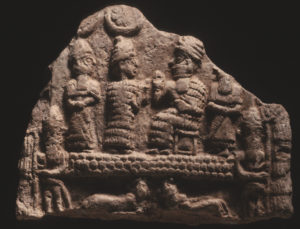 (Utu, twin sister Inanna, father Nannar, & son Papsukal damaged)
(Utu, twin sister Inanna, father Nannar, & son Papsukal damaged)
Dust piled up in the unuribanda of Nanna (Nannar)
The rushes grew, the rushes grew, the mourning reeds grew.
Boats and barges ceased docking at the Shining Quay.
Nothing moved on your watercourse which was fit for barges.
The plans of the festivals at the place of the divine rituals were altered.
The boat with first-fruit offerings of the father who begot Nanna no longer brought first-fruit offerings.
Its food offerings could not be taken to Enlil in Nibru.
Its watercourse was empty, barges could not travel.
328-339 There were no paths on either of its banks, long grass grew there.
The reed fence of the well-stocked cattle-pen of Nanna was split open.
The reed huts were overrun, their walls were breached.
The cows and their young were captured and carried off to enemy territory.
The munzer-fed cows took an unfamiliar path in an open country that they did not know.
Gayau, who loves cows, dropped his weapon in the dung.
Cuni-dug, who stores butter and cheese, did not store butter and cheese.
Those who are unfamiliar with butter were churning the butter.
Those who are unfamiliar with milk were curdling (?) the milk.
The sound of the churning vat did not resound in the cattle-pen.
Like mighty fire that once burnt, its smoke is extinguished.
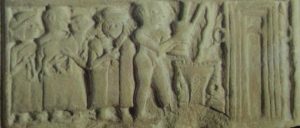
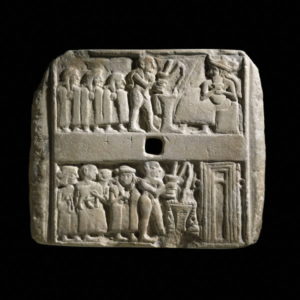 (food & drink brought to giant god Nannar in the temple of Ur, the duty of all high-priests)
(food & drink brought to giant god Nannar in the temple of Ur, the duty of all high-priests)
The great dining hall of Nanna …….
340-349 Suen (Sin) wept to his father Enlil:
“O father who begot me, why have you turned away from my city which was built (?) for you?
O Enlil, why have you turned away from my Urim which was built (?) for you?
The boat with first-fruit offerings no longer brings first-fruit offerings to the father who begot him.
(Enlil‘s temple residence in Nippur, Command Central for all alien Anunnaki gods stationed on Earth Colony)
Your food offerings can no longer be brought to Enlil in Nibru (Nippur, named after their planet Nibiru).
The en priests of the countryside and city have been carried off by phantoms.
Urim, like a city raked by a hoe, is to be counted as a ruin-mound.
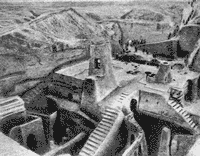 (mud-brick-built Ki-ur in Nippur)
(mud-brick-built Ki-ur in Nippur)
The Ki-ur, Enlil‘s resting-place, has become a haunted shrine.
O Enlil, gaze upon your city, an empty wasteland.
Gaze upon your city Nibru, an empty wasteland.
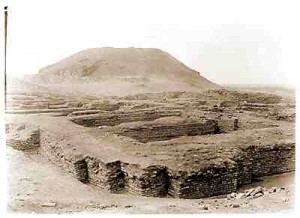 (Nannar‘s ziggurat residence with city of Ur way below)
(Nannar‘s ziggurat residence with city of Ur way below)
350-356 “The dogs of Urim no longer sniff at the base of the city wall.
The man who used to drill large wells scratches the ground in the market place.
My father who begot me, enclose in your embrace my city which is all alone.
(Enki, King Anu in his sky-disc, & Enlil, sons of Anu ruling Earth Colony, Apkulla pilots on each end, & Tree of Life)
Enlil, return to your embrace my Urim which is all alone.
Enclose in your embrace my E-kic-nu-jal (Nannar’s residence) which is all alone.
May you bring forth offspring in Urim, may you multiply its people.
May you restore the divine powers of Sumer that have been forgotten.”
357 3rd kirugu.
358 O good house, good house! O its people, its people!
359 Jicgijal.
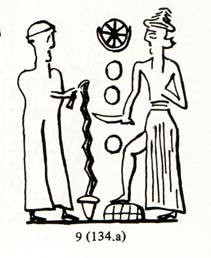 (Nannar & son Utu, Nannar’s Moon Crescent symbol, & Inanna’s 8-Pointed Star symbol)
(Nannar & son Utu, Nannar’s Moon Crescent symbol, & Inanna’s 8-Pointed Star symbol)
360-370 Enlil then answered his son Suen:
“There is lamentation in the haunted city, reeds of mourning grow there.
(1 ms. adds the line: In its midst there is lamentation, reeds of mourning grow there.)
In its midst the people pass their days in sighing.
(1 ms. adds the line: My son, the noble son ……, why do you concern yourself with crying?)
Oh Nanna, the noble son ……, why do you concern yourself with crying?
The judgment uttered by the assembly cannot be reversed.
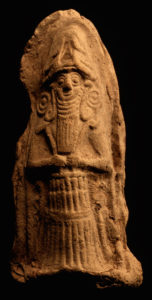
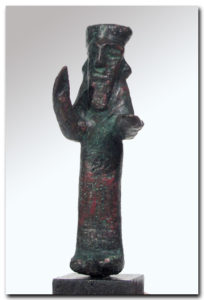 (Anu, King of all Anunnaki on planet Nibiru & on Earth, his son & heir Enlil)
(Anu, King of all Anunnaki on planet Nibiru & on Earth, his son & heir Enlil)
The word of An and Enlil knows no overturning.
Urim was indeed given kingship but it was not given an eternal reign.
From time immemorial, since the Land was founded, until people multiplied,
who has ever seen a reign of kingship that would take precedence for ever?
The reign of its kingship had been long indeed but had to exhaust itself.
O my Nanna, do not exert yourself in vain, abandon your city.”
371-377 Then my king, the noble son, became distraught.
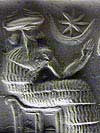
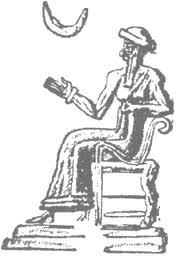 (Nannar, patron god of Ur, & his Moon Crescent symbol, as is now with Islam; & the 8-pointed star symbol of Anu, later given to Inanna)
(Nannar, patron god of Ur, & his Moon Crescent symbol, as is now with Islam; & the 8-pointed star symbol of Anu, later given to Inanna)
Lord Acimbabbar (Nannar / Sin), the noble son, grieved.
Nanna who loves his city left his city.
(huge metropolis of Ur with Nannar‘s temple residence, home of Biblical Abraham)
Suen (Nannar) took an unfamiliar path away from his beloved Urim.
In order to go as an exile from her city to foreign territory,
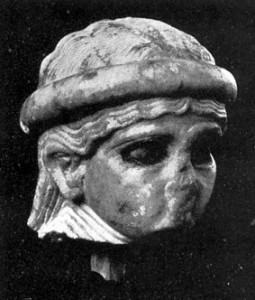 (Nannar‘s spouse Ningal, mother to Inanna & twin Utu)
(Nannar‘s spouse Ningal, mother to Inanna & twin Utu)
Ningal quickly clothed herself and left the city.
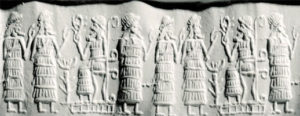 (giant alien Anuna / Anunnaki gods on Earth)
(giant alien Anuna / Anunnaki gods on Earth)
The Anuna stepped outside of Urim.
378-388 …… approached Urim.
The trees of Urim were sick, its reeds were sick.
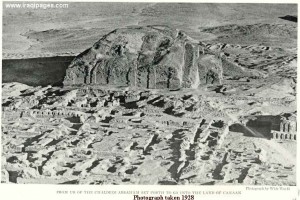 (Nannar & Ningal‘s ziggurat residence in Ur, city way below, place of Biblical Abraham & father Terah, Nannar‘s High-Priest, butler of Nannar‘s residence)
(Nannar & Ningal‘s ziggurat residence in Ur, city way below, place of Biblical Abraham & father Terah, Nannar‘s High-Priest, butler of Nannar‘s residence)
Laments sounded all along its city wall.
Daily there was slaughter before it.
Large axes were sharpened in front of Urim.
The spears, the arms of battle, were prepared.
The large bows, javelin and shield gathered together to strike.
The barbed arrows covered its outer side like a raining cloud.
Large stones, one after another, fell with great thuds.
(1 ms. adds the line: Daily the evil wind returned in the city.)
Urim, confident in its own strength, stood ready for the murderers.
Its people, oppressed by the enemy, could not withstand their weapons.
389-402 In the city, those who had not been felled by weapons succumbed to hunger.
Hunger filled the city like water, it would not cease.
This hunger contorted people’s faces, twisted their muscles.
Its people were as if drowning in a pond, they gasped for breath.
Its king breathed heavily in his palace, all alone.
Its people dropped their weapons, their weapons hit the ground.
They struck their necks with their hands and cried.
They sought counsel with each other, they searched for clarification:
“Alas, what can we say about it? What more can we add to it?
How long until we are finished off by this catastrophe?
Inside Urim there is death, outside it there is death.
Inside it we are to be finished off by famine.
Outside it we are to be finished off by Elamite weapons.
In Urim the enemy oppresses us, oh, we are finished.”
403-410 The people took refuge (?) behind the city walls.
They were united in fear.
The palace that was destroyed by onrushing water was defiled, its doorbolts were torn out.
Elam, like a swelling flood wave, left (?) only the ghosts.
In Urim people were smashed as if they were clay pots.
Its refugees were unable to flee, they were trapped inside the walls.
(1 ms. adds 3 lines: Like fish living in a pond, they tried to escape.
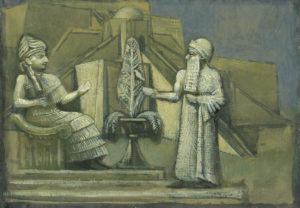 (Ningal & 2/3rds divine king of Ur, Ur-Nammu, in the E-kic-nu-jal of Nannar)
(Ningal & 2/3rds divine king of Ur, Ur-Nammu, in the E-kic-nu-jal of Nannar)
The enemy seized the E-kic-nu-jal of Nanna.
They ripped out its heavy …….)
The statues that were in the treasury were cut down.
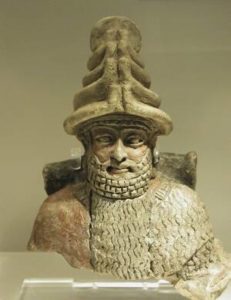
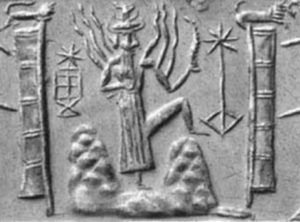 (Utu, Nannar‘s son, Commander of the Space Ports)
(Utu, Nannar‘s son, Commander of the Space Ports)
The great stewardess Niniagar (Utu‘s daughter) ran away from the storehouse.
Its throne was cast down before it, she threw herself down into the dust.
411-419 Its mighty cows with shining horns were captured, their horns were cut off.
Its unblemished oxen and grass-fed sheep were slaughtered.
(1 ms. adds the line: They were cut down as date palms and were tied together.)
The palm-trees, strong as mighty copper, the heroic strength,
were torn out like rushes, were plucked like rushes, their trunks were turned sideways.
Their tops lay in the dust, there was no one to raise them.
The midriffs of their palm fronds were cut off and their tops were burnt off.
Their date spadices that used to fall (?) on the well were torn out.
The fertile reeds, which grew in the sacred ……, were defiled.
The great tribute that they had collected was hauled off to the mountains.
420-434 The house’s great door ornament fell down, its parapet was destroyed.
The wild animals that were intertwined on its left and right lay before it like heroes smitten by heroes.
Its gaping-mouthed dragons and its awe-inspiring lions were pulled down
with ropes like captured wild bulls and carried off to enemy territory.
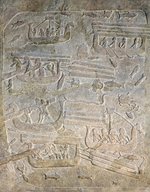 (cedar timber brought to the gods in Sumer from Lebanon)
(cedar timber brought to the gods in Sumer from Lebanon)
The fragrance of the sacred seat of Nanna, formerly like a fragrant cedar grove, was destroyed.
(1 ms. adds the line: Its architrave …… gold and lapis lazuli.)
The glory of the house, whose glory was once so lovely, was extinguished.
Like a storm that fills all the lands, it was built there like twilight in the heavens;
its doors adorned with the heavenly stars, its …….
Great bronze latches …… were torn out.
Its hinges …….
Together with its door fittings it (?) wept bitterly like a fugitive.
The bolt, the holy lock and the great door were not fastened for it.
The noise of the door being fastened had ceased; there was no one to fasten it.
The …… and was put out in the square.
(Ningal, 2/3rds divine Ur King Ur-Nammu, his mother-goddess Ninsun, again, & Nannar seated on his throne in Ur)
435-448 The food offerings …… of his royal dining place were altered.
In its sacred place (?) the tigi, cem and ala instruments did not sound.
Its mighty tigi …… did not perform its sacred song.
Verdicts were not given at the Dubla-mah, the place where oaths used to be taken.
The throne was not set up at its place of judgment, justice was not administered.
Alamuc threw down his scepter, his hands trembling.
In the sacred bedchamber of Nanna musicians no longer played the balaj drum.
The sacred box that no one had set eyes upon was seen by the enemy.
The divine bed was not set up, it was not spread with clean hay.
The statues that were in the treasury were cut down.
The cook, the dream interpreter, and the seal keeper did not perform the ceremonies properly.
They stood by submissively and were carried off by the foreigners.
The holy usga priests of the sacred lustrations, the linen-clad priests,
forsook the divine plans and sacred divine powers, they went off to a foreign city.
(top: Inanna in her sky-disc above mountains, bottom: Utu, Nannar, & Ningal)
449-459 In his grief Suen approached his father.
He went down on his knee in front of Enlil, the father who begot him:
“O father who begot me, how long will the enemy eye be cast upon my account, how long ……?
The lordship and the kingship that you bestowed ……, father Enlil, the one who advises with just words,
the wise words of the Land ……, your inimical judgment ……,
look into your darkened heart, terrifying like waves.
O father Enlil, the fate that you have decreed cannot be explained, the …… of lordship, my ornament.”
…… he put on a garment of mourning.
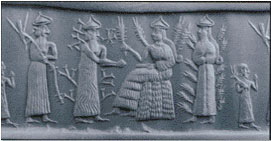 (Enlil with plow, father-in-law Haia, the Barley God, mother-in-law Nisaba, Goddess of Grain, spouse Ninlil, also Grain Goddess, & unidentified with dinner, when gods did the work)
(Enlil with plow, father-in-law Haia, the Barley God, mother-in-law Nisaba, Goddess of Grain, spouse Ninlil, also Grain Goddess, & unidentified with dinner, when gods did the work)
460-474 Enlil then provided a favorable response to his son Suen:
“My son, the city built for you in joy and prosperity was given to you as your reign.
The destroyed city, the great wall, the walls with broken battlements: all this too is part of that reign.
…… the black, black days of the reign that has been your lot.
As for dwelling in your home, the E-temen-ni-guru (ziggurat), that was properly built —
indeed Urim shall be rebuilt in splendor, the people shall bow down to you.
There is to be bounty at its base, there is to be grain.
There is to be splendor at its top, the sun shall rejoice there.
Let an abundance of grain embrace its table.
May Urim, the city whose fate was pronounced by An, be restored for you.”
Having pronounced his blessing, Enlil raised his head toward the heavens:
“May the land, south and highland, be organized for Nanna.
May the roads of the mountains be set in order for Suen.
Like a cloud hugging the earth, they shall submit to him.
By order of An and Enlil it shall be conferred.”
475-477 A Father Nanna stood in his city of Urim with head raised high again.
The youth Suen could enter again into the E-kic-nu-jal.
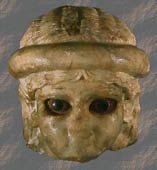 (brown-eyed Ningal, Nannar‘s spouse, Enlil‘s sister-in-law & daughter-in-law)
(brown-eyed Ningal, Nannar‘s spouse, Enlil‘s sister-in-law & daughter-in-law)
Ningal refreshed herself in her sacred living quarters.
(1 ms. adds the line: In Urim she could enter again into her E-kic-nu-jal.)
478 4th kirugu.
479-481 There is lamentation in the haunted city, mourning reeds grew there.
In its midst there is lamentation, mourning reeds grew there.
Its people spend their days in moaning.
482 Jicgijal.
483-492 O bitter storm, retreat o storm, storm return to your home.
O storm that destroys cities, retreat o storm, storm return to your home.
O storm that destroys houses, retreat o storm, storm return to your home.
Indeed the storm that blew on Sumer, blew also on the foreign lands.
Indeed the storm that blew on the land, blew on the foreign lands.
It has blown on Tidnum, it has blown on the foreign lands.
It has blown on Gutium, it has blown on the foreign lands.
It has blown on Ancan, it has blown on the foreign lands.
It leveled Ancan like a blowing evil wind.
Famine has overwhelmed the evildoer; those people will have to submit.
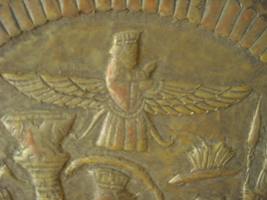 (King Anu in his winged sky-disc, father in heaven / planet Nibiru to the “sons of god” who came down to Earth, & colonized it as their own)
(King Anu in his winged sky-disc, father in heaven / planet Nibiru to the “sons of god” who came down to Earth, & colonized it as their own)
493-504 May An not change the divine powers (alien technologies) of heaven,
the divine plans for treating the people with justice.
May An not change the decisions and judgments to lead the people properly.
To travel on the roads of the Land: may An not change it.
May An and Enlil not change it, may An not change it.
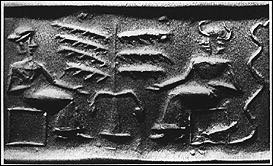 (Ninmah & brother Enki with Tree of Life, to fashion “modern man” into their image, & into their likeness)
(Ninmah & brother Enki with Tree of Life, to fashion “modern man” into their image, & into their likeness)
May Enki and Ninmah (Ninhursag) not change it, may An not change it.
 (land of the gods between the rivers Euphrates & Tigris, the “Eden”, where “modern man” & all things began)
(land of the gods between the rivers Euphrates & Tigris, the “Eden”, where “modern man” & all things began)
That the Tigris and Euphrates should again carry water: may An not change it.
That there should be rain in the skies and on the ground speckled barley: may An (Anu) not change it.
That there should be watercourses with water and fields with grain: may An not change it.
That the marshes should support fish and fowl: may An not change it.
That old reeds and fresh reeds should grow in the reed-beds: may An not change it.
May An and Enlil not change it.
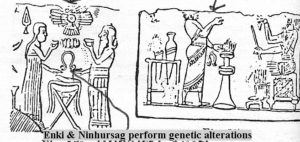
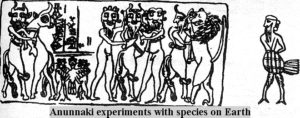 (Ninhursag & brother Enki in lab conducting DNA experiments on primitive earthlings, attempts to fashion their replacement workers)
(Ninhursag & brother Enki in lab conducting DNA experiments on primitive earthlings, attempts to fashion their replacement workers)
May Enki and Ninmah not change it.
505-518 That the orchards should bear syrup and grapes,
that the high plain should bear the macgurum tree, that there should be long life in the palace,
that the sea should bring forth every abundance: may An not change it.
The land densely populated from south to uplands: may An not change it.
May An and Enlil not change it, may An not change it.
May Enki and Ninmah not change it, may An not change it.
That cities should be rebuilt, that people should be numerous,
that in the whole universe the people should be cared for;
O Nanna, your kingship is sweet, return to your place.
May a good abundant reign be long-lasting in Urim.
Let its people lie down in safe pastures, let them reproduce.
O mankind ……, princess overcome by lamentation and crying!
O Nanna! O your city! O your house! O your people!
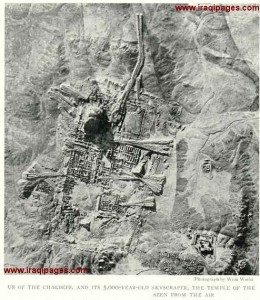 (aerial view of Ur ruins)
(aerial view of Ur ruins)
519 5th kirugu.
